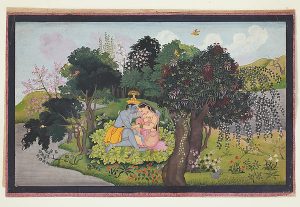To open our Lunchtime Lyrics series 2018-19, we will read Brajabuli songs. These poems are part of an ongoing project of translation of the earliest anthology of Brajabuli, Bengali, and Sanskrit Vaishnava lyric poems titled Kshanadagitachintamani and compiled by Vishvanath Chakravarti in the late 17th century. Vishnavath Chakravarti was a major Gaudiya scholar who is mostly known form his Sanskrit commentaries on the canonical works of the sect. He also composed vernacular poetry under the pen name “Harivallabha.”
The text and translation of the songs (handouts will be distributed on Monday): https://uchicago.box.com/v/a18w2a
(For other translations of Vaishnava poems from eastern India that I presented in previous Lunchtime Lyrics sessions, see S18-W8, W18-W1, A17-W7, A17-W5.)

